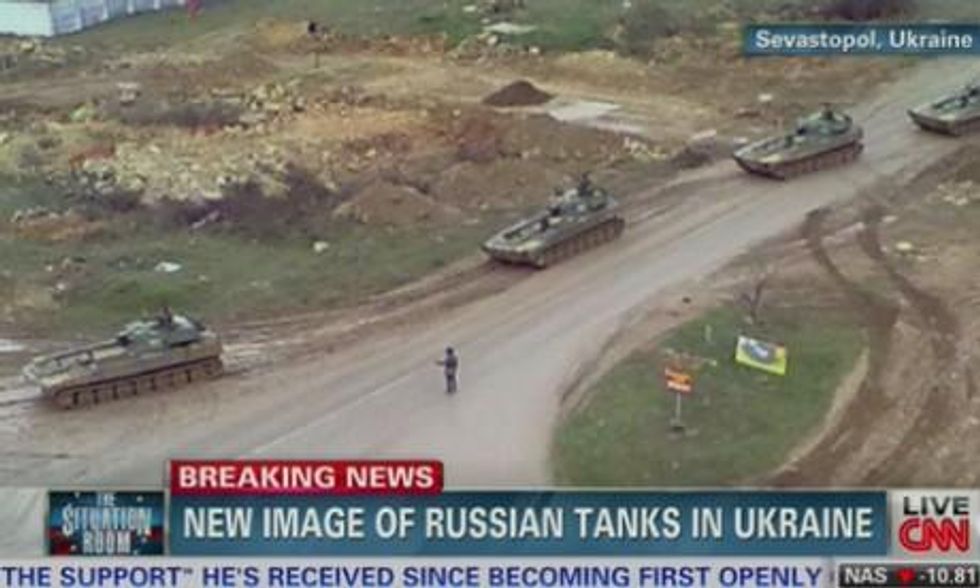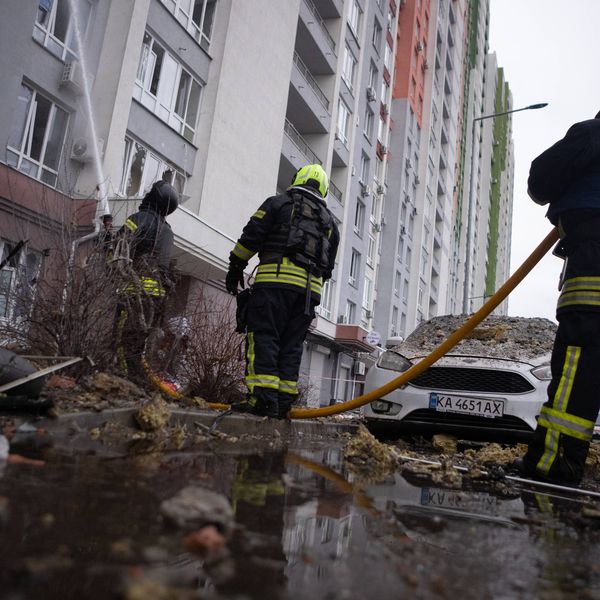Russian Military Mobilizes in Ukraine
Crimea the "flashpoint" in escalation as Russian parliament votes to authorize the use of armed force

Reuters is now reporting that "after a day of escalating rhetoric and activity, a Kremlin spokesman says that Russia hopes there will be no further escalation and that Putin has not yet decided if he will send troops into Ukraine."
Alarms across the globe sounded off after the Russian parliament greenlit a request by Russian President Vladamir Putin to employ the Russian military "in defense of Russians and Russian interests" in Ukraine.
The U.N. Security Council called an emergency meeting Saturday on the escalating crisis.
In Ukraine, opposition leader and likely presidential candidate, Vitaly Klitschko, called for a "general mobilization" and nationalist opposition groups called on their members to "mobilize and arm themselves."
Earlier
The situation in Ukraine continues to unravel Saturday as Russia's federation council approved a request by Russian President Vladamir Putin to use armed force in Ukraine.
"Putin says the move is needed to protect ethnic Russians and the personnel of a Russian military base in Ukraine's strategic region of Crimea," AP reports.
Speeches ahead of the vote revealed "unanimous" support "to use armed forces in defense of Russians and Russian interests, anywhere in the territory of Ukraine."
Following the overthrow last weekend of Ukrainian President Viktor Yanukovich, the Black Sea peninsula of Crimea has become the focus of the crisis. Crimea has largely shown support for the deposed Yanukovych, in opposition to what they call a 'coup' orchestrated by anti-democratic elements, western interference, and neo-fascists in Kiev.
Twitter continued to capture live coverage of the heightening tensions and reactions from the international community:
Tweets from https://twitter.com/commondreams/on-ukraine
Ahead of the vote, Ukrainian officials said the Russian military had already begun their occupation.
Reuters reports:
Armed men wearing combat uniform with no identification markings control two airports in Crimea, which hosts Russia's Black Sea Fleet, and have taken over the regional parliament in what Kiev described as an occupation by Moscow's forces.
"It is unacceptable when armored Russian military vehicles are out in the center of Ukrainian towns," Ukrainian Prime Minister Arseny Yatseniuk said at the start of a government meeting in Kiev.
"We do not give in to provocative actions, we do not use force and we demand that Russia stop its provocative actions and return the troops to base."
Russia says any movements by its military in Crimea are in line with agreements with Ukraine in the lease of the naval base in the port city of Sevastopol and accused Kiev of trying to destabilize the Black Sea peninsula.
According to the German Institute for International And Security Affairs, Russia's Sevastopol base may already house as many as 26,000 troops.
"Crimea is the flashpoint. If Ukraine unravels, it will begin there," says Frida Ghitis, world affairs columnist for The Miami Herald and World Politics Review. "If Russia decides to launch a military intervention, its justification and its target will be the Crimea."
Ghitis explains that in Crimea, many of Ukraine's internal conflicts, particularly regarding their relationship with Russia, are magnified.
Ghitis writes:
The majority of residents are ethnic Russians. The rest are ethnic Ukrainians and Tatars. Many of the ethnic Russians feel a strong allegiance to Moscow. Some would like the region to break away and become independent of both Kiev and Moscow. Others would like it to become a part of Russia.
The Guardian continues to provide live coverage of the unfolding situation.
_________________________________
An Urgent Message From Our Co-Founder
Dear Common Dreams reader, The U.S. is on a fast track to authoritarianism like nothing I've ever seen. Meanwhile, corporate news outlets are utterly capitulating to Trump, twisting their coverage to avoid drawing his ire while lining up to stuff cash in his pockets. That's why I believe that Common Dreams is doing the best and most consequential reporting that we've ever done. Our small but mighty team is a progressive reporting powerhouse, covering the news every day that the corporate media never will. Our mission has always been simple: To inform. To inspire. And to ignite change for the common good. Now here's the key piece that I want all our readers to understand: None of this would be possible without your financial support. That's not just some fundraising cliche. It's the absolute and literal truth. We don't accept corporate advertising and never will. We don't have a paywall because we don't think people should be blocked from critical news based on their ability to pay. Everything we do is funded by the donations of readers like you. Will you donate now to help power the nonprofit, independent reporting of Common Dreams? Thank you for being a vital member of our community. Together, we can keep independent journalism alive when it’s needed most. - Craig Brown, Co-founder |

Reuters is now reporting that "after a day of escalating rhetoric and activity, a Kremlin spokesman says that Russia hopes there will be no further escalation and that Putin has not yet decided if he will send troops into Ukraine."
Alarms across the globe sounded off after the Russian parliament greenlit a request by Russian President Vladamir Putin to employ the Russian military "in defense of Russians and Russian interests" in Ukraine.
The U.N. Security Council called an emergency meeting Saturday on the escalating crisis.
In Ukraine, opposition leader and likely presidential candidate, Vitaly Klitschko, called for a "general mobilization" and nationalist opposition groups called on their members to "mobilize and arm themselves."
Earlier
The situation in Ukraine continues to unravel Saturday as Russia's federation council approved a request by Russian President Vladamir Putin to use armed force in Ukraine.
"Putin says the move is needed to protect ethnic Russians and the personnel of a Russian military base in Ukraine's strategic region of Crimea," AP reports.
Speeches ahead of the vote revealed "unanimous" support "to use armed forces in defense of Russians and Russian interests, anywhere in the territory of Ukraine."
Following the overthrow last weekend of Ukrainian President Viktor Yanukovich, the Black Sea peninsula of Crimea has become the focus of the crisis. Crimea has largely shown support for the deposed Yanukovych, in opposition to what they call a 'coup' orchestrated by anti-democratic elements, western interference, and neo-fascists in Kiev.
Twitter continued to capture live coverage of the heightening tensions and reactions from the international community:
Tweets from https://twitter.com/commondreams/on-ukraine
Ahead of the vote, Ukrainian officials said the Russian military had already begun their occupation.
Reuters reports:
Armed men wearing combat uniform with no identification markings control two airports in Crimea, which hosts Russia's Black Sea Fleet, and have taken over the regional parliament in what Kiev described as an occupation by Moscow's forces.
"It is unacceptable when armored Russian military vehicles are out in the center of Ukrainian towns," Ukrainian Prime Minister Arseny Yatseniuk said at the start of a government meeting in Kiev.
"We do not give in to provocative actions, we do not use force and we demand that Russia stop its provocative actions and return the troops to base."
Russia says any movements by its military in Crimea are in line with agreements with Ukraine in the lease of the naval base in the port city of Sevastopol and accused Kiev of trying to destabilize the Black Sea peninsula.
According to the German Institute for International And Security Affairs, Russia's Sevastopol base may already house as many as 26,000 troops.
"Crimea is the flashpoint. If Ukraine unravels, it will begin there," says Frida Ghitis, world affairs columnist for The Miami Herald and World Politics Review. "If Russia decides to launch a military intervention, its justification and its target will be the Crimea."
Ghitis explains that in Crimea, many of Ukraine's internal conflicts, particularly regarding their relationship with Russia, are magnified.
Ghitis writes:
The majority of residents are ethnic Russians. The rest are ethnic Ukrainians and Tatars. Many of the ethnic Russians feel a strong allegiance to Moscow. Some would like the region to break away and become independent of both Kiev and Moscow. Others would like it to become a part of Russia.
The Guardian continues to provide live coverage of the unfolding situation.
_________________________________

Reuters is now reporting that "after a day of escalating rhetoric and activity, a Kremlin spokesman says that Russia hopes there will be no further escalation and that Putin has not yet decided if he will send troops into Ukraine."
Alarms across the globe sounded off after the Russian parliament greenlit a request by Russian President Vladamir Putin to employ the Russian military "in defense of Russians and Russian interests" in Ukraine.
The U.N. Security Council called an emergency meeting Saturday on the escalating crisis.
In Ukraine, opposition leader and likely presidential candidate, Vitaly Klitschko, called for a "general mobilization" and nationalist opposition groups called on their members to "mobilize and arm themselves."
Earlier
The situation in Ukraine continues to unravel Saturday as Russia's federation council approved a request by Russian President Vladamir Putin to use armed force in Ukraine.
"Putin says the move is needed to protect ethnic Russians and the personnel of a Russian military base in Ukraine's strategic region of Crimea," AP reports.
Speeches ahead of the vote revealed "unanimous" support "to use armed forces in defense of Russians and Russian interests, anywhere in the territory of Ukraine."
Following the overthrow last weekend of Ukrainian President Viktor Yanukovich, the Black Sea peninsula of Crimea has become the focus of the crisis. Crimea has largely shown support for the deposed Yanukovych, in opposition to what they call a 'coup' orchestrated by anti-democratic elements, western interference, and neo-fascists in Kiev.
Twitter continued to capture live coverage of the heightening tensions and reactions from the international community:
Tweets from https://twitter.com/commondreams/on-ukraine
Ahead of the vote, Ukrainian officials said the Russian military had already begun their occupation.
Reuters reports:
Armed men wearing combat uniform with no identification markings control two airports in Crimea, which hosts Russia's Black Sea Fleet, and have taken over the regional parliament in what Kiev described as an occupation by Moscow's forces.
"It is unacceptable when armored Russian military vehicles are out in the center of Ukrainian towns," Ukrainian Prime Minister Arseny Yatseniuk said at the start of a government meeting in Kiev.
"We do not give in to provocative actions, we do not use force and we demand that Russia stop its provocative actions and return the troops to base."
Russia says any movements by its military in Crimea are in line with agreements with Ukraine in the lease of the naval base in the port city of Sevastopol and accused Kiev of trying to destabilize the Black Sea peninsula.
According to the German Institute for International And Security Affairs, Russia's Sevastopol base may already house as many as 26,000 troops.
"Crimea is the flashpoint. If Ukraine unravels, it will begin there," says Frida Ghitis, world affairs columnist for The Miami Herald and World Politics Review. "If Russia decides to launch a military intervention, its justification and its target will be the Crimea."
Ghitis explains that in Crimea, many of Ukraine's internal conflicts, particularly regarding their relationship with Russia, are magnified.
Ghitis writes:
The majority of residents are ethnic Russians. The rest are ethnic Ukrainians and Tatars. Many of the ethnic Russians feel a strong allegiance to Moscow. Some would like the region to break away and become independent of both Kiev and Moscow. Others would like it to become a part of Russia.
The Guardian continues to provide live coverage of the unfolding situation.
_________________________________

